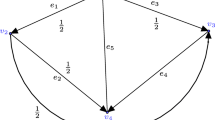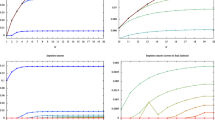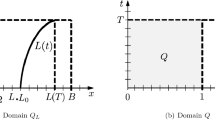Abstract
This paper focuses on boundary approximate controllability under positivity constraints of a wide range of infinite-dimensional control systems. We develop frequency-domain controllability criteria. Firstly, we derive a controllability result under positivity constraints on the control for such systems. Then, and more importantly, we provide a necessary and sufficient condition for controllability under positivity constraints on the control and the state. The obtained results are applied to the controllability of transportation and heat conduction networks. In particular, provided that the underlying graph is strongly connected, the controllability under positivity constraints on the control/state of transport network systems is fully characterized by a Kalman-type rank condition. For a system of heat equations with Robin boundary conditions on a path-like network, we establish approximate controllability under positivity state constraint with a single positive input through the starting node. However, we prove the lack of controllability under unilateral control constraint.



Similar content being viewed by others
References
Aliprantis, C.D., Burkinshaw, O.: Positive Operators. Springer, The Netherlands (2006)
Altomare, F.: Korovkin-type theorems and approximation by positive linear operators. Surv. Approx. Theory. 5, 92–164 (2010)
Arendt, W.: Resolvent positive operators. Proc. London Math. Soc. 54(2), 321–349 (1987)
Arendt, W., Batty, C.J.K., Hieber, M., Neubrander, F.: Vector-Valued Laplace Transforms and Cauchy Problems. Springer, Berlin (2011)
Arendt, W., Grabosch, A., Greiner, G., Moustakas, U., Nagel, R., Schlotterbeck, U., Groh, U., Lotz, H.P., Neubrander, F.: One-Parameter Semigroups of Positive Operators, vol. 1184. Springer, Berlin (1986)
Bátkai, A., Fijavz̃, M.K., Rhandi, A.: Positive Operator Semigroups. From Finite to Infinite Dimensions. vol. 257. Springer, Basel (2017)
Boulite, S., Bouslous, H., El Azzouzi, M., Maniar, L.: Approximate positive controllability of positive boundary control system. Positivity 18(2), 375–393 (2014)
Brammer, R.F.: Controllability in linear autonomous systems with positive controllers. SIAM J. Control 10(2), 339–353 (1972)
Chen, A., Morris, K.: Well-posedness of boundary control systems. SIAM J. Control Optim. 42(4), 1244–1265 (2003)
Curtain, F.R., Zwart, H.J.: An Introduction to Infinite-Dimensional Linear Systems Theory, vol. 21. Springer Science & Business Media, Berlin (2012)
El azzouzi, M., Bouslous, H., Maniar, L., Boulite, S.: Constrained approximate controllability of boundary control systems. IMA J. Math. Control Inf. 33(3), 669–683 (2016)
El gantouh, Y.: Positivity of infinite dimensional linear systems. arXivpreprint arXiv:2208.10617 (2022)
El gantouh, Y., Hadd, S., Rhandi, A.: Approximate controllabilty of network systems. Evol. Equ. Control Theory 10(4), 749–766 (2021)
Greiner, G.: Perturbing the boundary conditions of a generator. Houst. J. Math. 13(2), 213–229 (1987)
Hadd, S., Manzo, R., Rhandi, A.: Unbounded perturbations of the generator domain. Discrete Contin. Dyn. Syst. 35(2), 703–723 (2015)
Klamka, J.: Positive controllability of positive dynamical systems. In Proceedings of the 2002 American Control Conference (IEEE Cat. No. CH37301), vol. 6, pp. 4632–4637 (2002)
Lasiecka, I., Triggiani, R.: Control theory for partial differential equations: Volume 1.In Abstract Parabolic Systems: Continuous and Approximation Theories. vol. 1. Cambridge University Press, Cambridge (2000)
Lions, J.L., Magens, E.: Non Homogeneous Boundary Value Problems and Applications, vol. 1. Springer, New York (1972)
Loheac, J., Trélat, E., Zuazua, E.: Minimal controllability time for the heat equation under unilateral state or control constraints. Math. Models Methods Appl. Sci. 27(9), 1587–1644 (2017)
Mehmeti, F.A., von Below, J., Nicaise, S. (eds.): PDE’s on multistructures (Proceedings Luminy/France 1999). Lecture Notes Pure Applied Mathematics, vol. 219. Dekker, New York (2001)
Mugnolo, D.: Semigroup Methods for Evolution Equations on Networks, vol. 20. Springer, Berlin (2014)
Raymond, A.R.: Introduction to Tensor Products of Banach Spaces, vol. 73. Springer, London (2002)
Salamon, D.: Infinite-dimensional linear system with unbounded control and observation: a functional analytic approach. Trans. Am. Math. Soc. 300(2), 383–431 (1987)
Schaefer, H.H.: Banach Lattices and Positive Operators. In Grundlehren der Mathematischen Wissenschaften, vol. 215. Springer, Berlin (1974)
Schanbacher, T.: Aspects of positivity in control theory. SIAM J. Control Optim. 27(3), 457–475 (1989)
Son, N.K.: A unified approach to constrained approximate controllability for the heat equations and the retarded equations. J. Math. Anal. Appl. 150(1), 1–19 (1990)
Staffans, O.J.: Well-Posed Linear Systems, vol. 103. Cambridge University Press, Cambridge (2005)
Tucsnak, M., Weiss, G.: Observation and Control for Operator Semigroups. Birkhäuser, Basel (2009)
Weiss, G.: Regular linear systems with feedback. Math. Control Signals Syst. 7(1), 23–57 (1994)
Acknowledgements
The author would like to thank Prof. Enrique Zuazua for his comments and suggestions. This work has been supported by the European Research Council (ERC) under the European Union’s Horizon 2020 research and innovation program (grant agreement No. 694126-DYCON).
Author information
Authors and Affiliations
Corresponding author
Additional information
Communicated by Irena Lasiecka.
Publisher's Note
Springer Nature remains neutral with regard to jurisdictional claims in published maps and institutional affiliations.
Appendix
Appendix
Here, we provide an appendix on technical lemmas needed for the proof of Corollary 5.1.
The following result introduces a modification of the so-called Szász–Mirakjan operator, cf. [2].
Lemma .1
Let \(f\in \mathcal {C}_b([0,+\infty )):=\{f\in {\mathcal {C}}([0,+\infty )):\;\exists \, \alpha \ge 0,\, \delta \ge 0\;\mathrm{such \, that }\; \vert f(x)\vert \le \delta e^{\alpha x} \} \) and define
where \(\varphi (x)=\frac{1}{v}(1-x)\) for \(x\in [0,1]\) and \(\varphi (x)=0\) for \(x\ge 1\). Then, the operators \(\mathscr {M}_n\) are linear positive and for every \(f\in \mathcal {C}_b([0,+\infty ))\) we have
Proof
To prove our claim, we will use the Korovkin theorem, see, e.g., [2]. To this end, we have to prove that the operators \(\mathscr {M}_n\) preserve the functions 1, \(\varphi (x)\), \((\varphi (x))^2\). In fact, a simple computation shows
and
where we have used the fact that \(\varphi ^2(\varphi ^{-1}(x))=x^2\). Therefore, from [2, Theorem 4.1], we get that
uniformly on [0, 1]. \(\square \)
The last lemma at the hand, one can derive the following density result.
Lemma .2
Let \(p\in [1,\infty )\) and \(v>0\) be fixed. Then,
Proof
Let \(p,q\in [1,\infty )\) with \(\frac{1}{p}+\frac{1}{q}=1\) and let \(g\in L^q([0,1])\) such that \( \int _{0}^{1} e^{-\frac{n}{v}(1-x)}g(x)\, dx\, \ge 0\) for all \(n\in {\mathbb {N}}\). Let \(0\le f\in \mathcal {C}([0,1])\) and define the function
Then, \(0\le h\in \mathcal {C}_b([0,+\infty ))\) and
The continuity of f, Lemma .1 and the dominated convergence theorem further yield
Moreover, since the positive cone in \(\mathcal {C}([0,1])\) is dense in \(L^p_+([0,1])\), we get that
and hence \(g\ge 0\). \(\square \)
Rights and permissions
Springer Nature or its licensor (e.g. a society or other partner) holds exclusive rights to this article under a publishing agreement with the author(s) or other rightsholder(s); author self-archiving of the accepted manuscript version of this article is solely governed by the terms of such publishing agreement and applicable law.
About this article
Cite this article
El gantouh, Y. Boundary Approximate Controllability under Positivity Constraints of Infinite-Dimensional Control Systems. J Optim Theory Appl 198, 449–478 (2023). https://doi.org/10.1007/s10957-023-02200-9
Received:
Accepted:
Published:
Issue Date:
DOI: https://doi.org/10.1007/s10957-023-02200-9
Keywords
- Infinite-dimensional control systems
- Positive semigroups
- Controllability under constraints
- PDEs on networks




